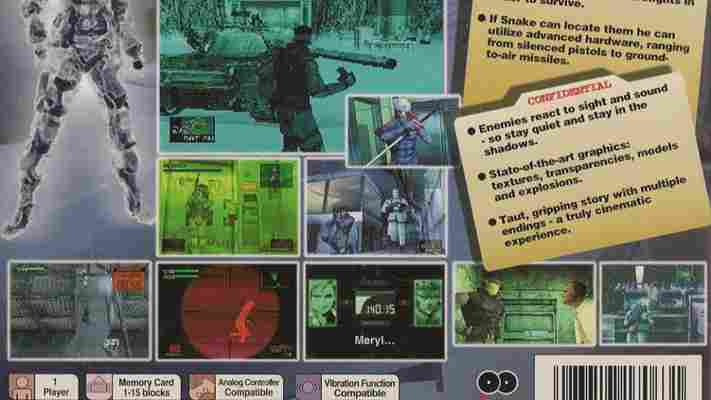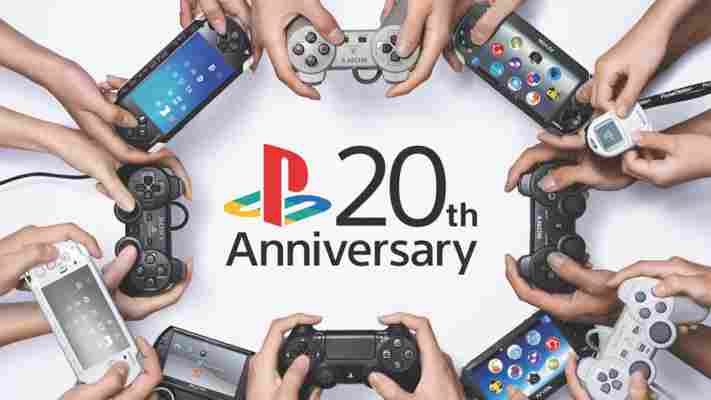Happy Birthday PlayStation - Sony's first foray into the word of gaming is officially 20 years old today. The original console might have long been superseded by Emotion Engines, Cell Processors, Blu-ray drives and AMD-powered x86 power , but it has a fond place in our hearts. To celebrate the occasion, we've been reminiscing over games gone by, digging into the archives in order to bring you some of our favourite stories and remind you what Sony has given the gaming world.
Sony's bizarre TV adverts
How do you build up excitement for a brand new games console? If you're Sony, you launch a ridiculous set of adverts guaranteed to grab your attention.
The 90's were filled with crazy adverts, both in print and on TV, and the games industry was responsible for some of the weirdest. From Sega accusing kids of playing with themselves to Nintendo suggesting the Game Boy Advance was so addictive you wouldn't notice piranha chewing on your ankles , it seems shock value was the order of the day, and Sony was no exception. We've included just two of the most memorable adverts below, but there were plenty more odd and eye-catching adverts - remember a bloodied Sara Cox posing for WipEout, suggesting the Zero-G racer was cerebral enough to give you an overdose on entertainment?
The advert above, otherwise known as "Mental Wealth" has Chris Cunningham's trademark grimy, home movie signature all over it. The man responsible for Aphex Twin's Come to Daddy and Windowlicker used CGI to give the actress a surreal, otherworldly appearance that had many channel surfers doing a double-take when it first aired. The "Shapes" trailer below, meanwhile, is a little more overt in how it grabs viewer attention.
A stellar line-up of games, from the original PlayStation and beyond
Undeniably the underdog when it first launched, Sony quickly transformed the PlayStation from an also-ran battling against the industry darlings Sega and Nintendo to a world dominating force to be reckoned with in only a few short years. It's fair to say the more powerful hardware, which was easier for developers to program than the Sega Saturn, and the larger capacity CD-ROM discs (which were cheaper to produce than the Nintendo 64's cartridges) played their part in making the PlayStation brand a success, but it was predominantly the huge range of titles the platform has played host to over the years that has been its biggest strength.
Editor Seth Barton remembers buying a PlayStation 2 specifically for TimeSplitters, the Free Radical shooter which took a lot of elements from Golden Eye and Perfect Dark, having been made by many of those games’ UK developers. "It was thin on plot, but had an incredibly frantic multiplayer game with both human players and bots in numerous configurations. The old DualShock controller was compatible with the new console, so getting four controllers together was easy, but it was frustrating you had to fork out for a multitap adaptor some four years after Nintendo had included four ports in its console. It was the last multitap I ever bought but well worth it.
"The other early PlayStation 2 game that really stands out is the unfortunately named Ring of Red, which was set in an alternative history where warfare is dominated by World War 2-styled mecha. Its been done since but at the time the idea of mixing that era’s tech with Japanese-style mecha was hugely exciting for me, and more than a little exotic. The game was sound too, a turn-based strategy title with real-time elements.
Despite some big exclusive titles, the PlayStation brand has never succumbed to being associated with any particular genre, region or title. That has allowed, for example, big British, Japanese (and American) games to sit side-by-side, and sell side-by-side upon it. It’s this fluidity that has allowed it to remain successful over 20 years.
Hideo Kojima breaks the Fourth Wall
Metal Gear Solid was undoubtedly one of the greatest games ever to grace the original PlayStation, if not one of the best games ever made, but Product Editor Tom had a tough time completing it when renting it from a video store.
"When Metal Gear Solid launched I was 11, meaning I was entirely reliant on pocket money and the local BlockBuster to fuel my gaming habit. I had been excited for MGS ever since my gaming magazine of choice at the time bundled a VHS copy of the E3 demo reel on the cover, so naturally I rented it as soon as I could. Everything was going great - I'd infiltrated Shadow Moses, encountered (and defeated) Revolver Ocelot, and was headed for the Nuclear Warhead Storage Building. However, I had no idea how to open the blast doors to get there.

A helpful call from Colonel Campbell reminded me to "check the back of the CD case" for the right frequency to call Meryl, who could open the door, but this being a Blockbuster rental, all I had was the yellow and blue Blockbuster case insert - not the official box art. My parents wouldn't buy a PC until later that year, so with no internet access the only way to find out was to head to my local Electronics Boutique and look up the codec frequency.
"When I returned the game at the end of the rental, I then had to explain why I'd written the numbers 140.15 in permanent marker on the jewel case."
The oddball games
There are countless obscure games for all consoles, but the PlayStation's massive library of titles across all three main territories (PAL for Europe, NTSC for North America and NTSC-J for Japan) meant there were plenty of standout titles that required gamers to take a little leap of faith before parting with their cash. One of staff writer Michael Passingham’s favourites definitely did not catch on.
“Airblade was PS2-exclusive Tony Hawk ripoff. Made by Criterion Games (of Burnout fame), this hoverboard extravaganza was nothing special. The hoverboard could have easily been a skateboard because the abilities of this futuristic hardware was never explored: the only mildly interesting thing it could do was boost. That’s it.
The dialogue was hammy, the physics were questionable and the game was ludicrously difficult (the speed run below is truly impressive), but what this title did have going for it was its multiplayer. The “Ribbon Tag” mode was a real delight, with two players duking it out to grab an ever-extending ribbon, performing tricks and jumps to stop their rival from grabbing it. I got my first PS2 quite late on so this felt like a launch title and was one of the first games I played on the already-established console.”
Games so compelling they break down console allegiances
Having been a staunch Nintendo fan her entire life, Senior Reporter Katharine Byrne didn't have anything to do with PlayStation consoles until a friend passed one along as they were upgrading to the newly launched PS2. "I didn't really know what games to buy at the time, but I was a fan of RPGs and several people had been telling just how good this thing called 'Final Fantasy' was, so I bought VIII first, loved it, and then promptly dived into VII and IX soon after." Despite picking up a GameCube on launch and putting Final Fantasy to one side in favour of Mario, Link and Samus, an advert for the questionable sequel to Final Fantasy X piqued her interest in returning to Sony hardware.
" Everyone knows X-2 is awful compared to the original, but there was something about having Yuna (one of the protagonists in FFX) as the main character that really, really made me want to buy a PS2 and play it. The costumes and characters looked cool (I was only 15 at the time) and I was really intrigued by the game's story. I even entered a phone competition on the TV to try and win one so I wouldn't have to buy the console myself. Unsurprisingly, I didn't win the console or the game (who ever does in these things?), but luckily I didn't have to wait long to finally play it, as my brother got a PS2 for his birthday soon after. So I dutifully bought Final Fantasy X and its sequel, played them both through from start to finish, and decided that, yes, Final Fantasy X really was worth buying a console for after all. Final Fantasy X-2, on the other hand... well, the less said about that, the better."

